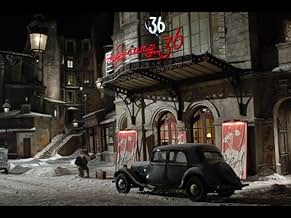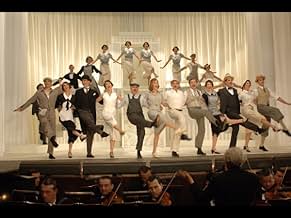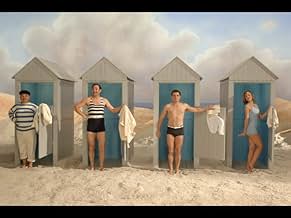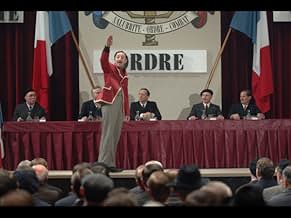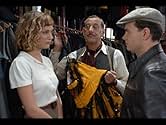When Chansonia, a nightclub, is shut down by the landlord, the stage manager Pigoil is forced to look for a new job. He finds hope when he discovers a young woman with a lovely singing voice... Read allWhen Chansonia, a nightclub, is shut down by the landlord, the stage manager Pigoil is forced to look for a new job. He finds hope when he discovers a young woman with a lovely singing voice.When Chansonia, a nightclub, is shut down by the landlord, the stage manager Pigoil is forced to look for a new job. He finds hope when he discovers a young woman with a lovely singing voice.
- Nominated for 1 Oscar
- 3 wins & 7 nominations total
Featured reviews
This movie was a surprising little gem. I knew nothing about it and went with some friends yesterday on a whim. It was beautifully photographed and the rendition of 1936 Paris seemed quite authentic. The costumes were exquisite, the story is engaging, and of all the characters were genuine. The scenes in the theater left me smelling the greasepaint
I think this movie captured me because I was once heavily involved in local, amateur theater where we knocked ourselves out putting on shows just for the fun of it. I could identify with these characters struggling to eke out a living and dreaming of fame and success. The contrast of such joyous activities and the hopes of Pigoil, Douce and Jacky, amongst others against those dark times in Europe gives this movie a wonderful, entertaining balance.
It is well worth seeing.
I think this movie captured me because I was once heavily involved in local, amateur theater where we knocked ourselves out putting on shows just for the fun of it. I could identify with these characters struggling to eke out a living and dreaming of fame and success. The contrast of such joyous activities and the hopes of Pigoil, Douce and Jacky, amongst others against those dark times in Europe gives this movie a wonderful, entertaining balance.
It is well worth seeing.
I loved it! Boz Luhrmann meets Cinema Paradiso in numerous ways. The plot is simple, as others here have already described. But it retains an abundance of charm. The undercurrents of antisemitism and fascism that were persistent in 1936 France are themes rarely seen on screen. Ditto for the Communist workers' movement during the same time. The clashes between these two groups were inevitable, and this film depicts that struggle brilliantly, without preaching to us or hitting us over the head with it. All the acting, singing and dancing are extremely well-done, and the cinematography, while Luhrmann-esquire is engaging. Best of all perhaps is the music. This film is destined to be a classic, and will always be on my favorites list. The only thing I would change is that I would retain the original title. The audience for this film is sophisticated enough to handle it.
I may have seen one of the last musical hall revivals in London a few years ago on The Strand—it was full of tinny song and dance that made you tap your feet and long for the good old days of vaudeville and innocence. The telly has pretty much killed that simple pleasure, but Paris 36, a melodramatic story of the revival of a Chansonia in northern Paris, 1936, revives the joy of ensemble acting and dancing, original music, and the intrigue so much a part of the lively arts when they become business and pleasure.
Three Parisians undertake saving a music hall in their section of Paris called Faubourg using the talents of a star-crossed couple supplying the on and off stage romance. The intrigue is much less than Cabaret's; the nostalgia is more than Cinema Paradiso's; it's all more Moulin Rouge than Amelie. The songs are fetching, made especially for the film, and the plot is pure cliché right down to the lecherous businessman and cute ingénue.
The background is unmistakably fascist versus socialist, owners battling workers for a depression-era slim slice of the economic pie and soul. Paris 36 risks it all with formulaic intrigue and predictable denouement. Yet throughout is a good cheer, a bel canto breeziness that draws you in to song, dance, history, and politics, never too heavy, light enough to make you wish that music hall still stood on The Strand.
Three Parisians undertake saving a music hall in their section of Paris called Faubourg using the talents of a star-crossed couple supplying the on and off stage romance. The intrigue is much less than Cabaret's; the nostalgia is more than Cinema Paradiso's; it's all more Moulin Rouge than Amelie. The songs are fetching, made especially for the film, and the plot is pure cliché right down to the lecherous businessman and cute ingénue.
The background is unmistakably fascist versus socialist, owners battling workers for a depression-era slim slice of the economic pie and soul. Paris 36 risks it all with formulaic intrigue and predictable denouement. Yet throughout is a good cheer, a bel canto breeziness that draws you in to song, dance, history, and politics, never too heavy, light enough to make you wish that music hall still stood on The Strand.
Pigoil (Gerard Jugnot) runs a small vaudeville like theater, the Chansonia, in the Faubourg section of Paris. His wife is a "star" of the theater and the rest of the performers are a tight-knit group. Perhaps, too close, for Pigoil is given a double whammy one day. First, his wife has been sleeping with not one, but, two of the other troupe members and, even more sadly, the owner of the building can not pay his debts (it is the depression everywhere) and commits suicide. Soon, Pigoil and his young, idolized son Jojo are barely scraping by. But, then, Pigoil makes a deal with the Fascist like gentleman who truly runs the neighborhood. Can his show group have one month to make the theater profitable again? The ruthless man agrees to give them a chance, for he has his eye on one of their newest performers, a beautiful young singer named Douce. Will the Chansonia become successful once more? This is an unusual look at life in the depression, for it has a French setting, where fascism was brewing in neighboring Germany and in France. There are many subplots to the main one, including one of an agoraphobic music teacher, residing across from the Chansonia, who was once a leading song writer and who has an unlikely connection to Douce. Needless to say, the recreation of the former theater district is very fine, as are the costumes, the cast, the story, and the direction. Therefore, if you like foreign films and unusual tales, put this on your list for future viewing. It is a fine example of quality French cinematic achievements.
If this film had been produced 60 to 70 years ago,it probably would have been directed by Jean Renoir and starred Jean Gabin as one of the central figures. 'Faubourg 36' (or as it is being distributed in English speaking countries as 'Paris 36')is a film that takes place in Paris, just before world war 2,when political tensions were at a boiling point between left leaning French & their ultra conservative right wing counterpoint (which would eventually embrace the Nazi party in Germany,especially when Hitler marched into Paris in the 1940's). A (failing)theatrical troupe,bent on preserving their beloved theater tries to pull things back together,they get support from some of the locals (including an alleged Communist,who claims he was in the Red Brigade in Russia),a young lass trying to break into the singing profession,a (mostly)unfunny comic & enough well meaning persons to try and bring things together. A corrupt local political figure,who wants to do little more than bring the ruination of the theater also looms. The film is complimented by a cracker jack cast of French professionals who turn in a splendid job of acting. The screenplay, although something of an overstuffed sandwich of sorts,is still well played out. The film features several songs,most of which are performed by the cast,themselves. At times,this film has a Busby Berkley feel to it (which is not a bad thing). In French with English subtitles. Rated PG-13 by the MPAA,this film contains a bit of rude language,some suggestive material that parents of very young children may not appreciate,and some violence (but nothing too gory that could disturb some sensitive audiences). Well worth a look.
Did you know
- TriviaFaubourg is not French for "the district." It is a contraction of "faux bourg", French for "false town" and were used to designate smaller towns attached to larger towns or cities. A lot of these faubourgs were independent cities until they were attached to Paris and lost all independence around during the 17th and 18th century. A new outer wall was later erected around the city. These faubourgs, especially those on the East side, were usually blue collar, with a very active night life.
- GoofsWhen Jacky accidentally turns on the radio while Pigoil is talking to his wife and her new lover, the radio is very loud immediately after Jacky flips the switch. On this type of old tube amplified radio, it would take several seconds for the tubes to heat up and amplify any signal, and the volume would go up very slowly.
- ConnectionsFeatured in La 82e cérémonie des Oscars (2010)
- How long is Paris 36?Powered by Alexa
Details
- Release date
- Countries of origin
- Official sites
- Language
- Also known as
- Paris 36
- Filming locations
- Surtainville, Manche, France(beach scenes by the end)
- Production companies
- See more company credits at IMDbPro
Box office
- Gross US & Canada
- $851,540
- Opening weekend US & Canada
- $44,690
- Apr 5, 2009
- Gross worldwide
- $12,940,622
- Runtime
- 2h(120 min)
- Color
- Sound mix
- Aspect ratio
- 2.35 : 1
Contribute to this page
Suggest an edit or add missing content





